|
FOCUS / FORUM
INDEX
|
 |
In 2008, the Forum Comment,
was relaunched as the Focus
reflecting the closer comment from
NEMP and the panel of educators. |
 |
|
Main Index for Focus / Forum
Introduction
to Focus / Forum
He
Whakaputanga Whakaaro –
Introduction for Mäori
Medium forums
|
| Forums by year of assessment |
|
|
|
Science
Art
Graphs, Tables & Maps
|
|
|
|
Music
Aspects of Technology
Reading & Speaking |
|
|
|
Information
Skills
Social Studies
Mathematics |
|
 |
|
Listening
& Viewing
Health & Phys. Ed.
Writing |
|
| Forums for Mäori Medium |
|
|
|
Science
Art
Graphs, Tables & Maps
|
|
|
|
Music
Aspects of Technology
Reading & Speaking |
|
|
|
Information
Skills
Social Studies
Mathematics |
|
 |
|
Listening
& Viewing
Health & Phys. Ed.
Writing |
|
|
|
|
|
 |
|
 |
|
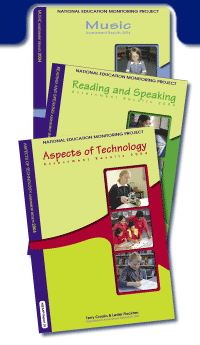
CLICK
on reports above to go directly
to comments |
|
FORUM
PARTICIPANTS
Irene Absalom
Sandra Aikin
Raewyn Allen
Susan Apáthy
Robyn Baker
Lynne Bell
Lynne Bowyer
Raiha Boyes
Kerry Brady
Roger Buckton
Alison Caldwell
Megan Chambers
Merryn Dunmill
Liz Eley
Yolande Franke
Naomi George
Alison Gilmore
Sonia Gogofski
Ray Griffiths
Julie Hepburn
Mary Hill
Alister Jones
Diane Leggett
Libby Limbrick
Linda Locke
Aleisha Mahoney
Mary Mason
Tracey McLellan
Frances Neill
Liz Patara
Tracy Rohan
Helen Rolinson
Bronwyn Rotheram
Juliet Small
Robyn Trinick |
|
The third
four-year cycle of national monitoring started in 2003.
Results from this third cycle will allow comparisons with
performances in the previous cycle of assessments.
The three reports on the 2004 assessment results were considered
by a national forum of teachers, subject specialists, representatives
of national organizations and government agencies, in June
2004. Their comments highlight what students are generally
doing well, and those areas where improvements are desirable.
The help of principals, teachers and Boards of Trustees in
making NEMP reports and this Forum Comment widely known is
encouraged and appreciated.
 |
Click
the Access Task icon for more information
about the tasks which will be available
to schools from December 2005. |
|
|
|
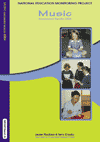 CLICK for
full report CLICK for
full report
|
GOOD
NEWS
• Achievement in music was similar for Mäori,
Pasifika and Pakeha students across all tasks.
• The majority of year 4 and year 8 students
enjoy learning music at school.
• Year 8 students achieved substantially better
than year 4 students in tasks involving understanding
and performing music. |
• Given
the challenging nature of the testing situation, it is
pleasing that most students have achieved at least moderate
success in most areas.
|
 |
CONCERNS
• Results from singing tasks continue to cause concern,
with evidence of difficulty in choosing a song to sing, singing
a familiar song tunefully, and learning and singing an unfamiliar
song.
• Students had moderate success in listening tasks but
many had difficulty communicating their ideas about music.

• It
is clear from the playing tasks and the NEMP survey that
while students are enthusiastic about instrumental playing,
they have limited opportunities to do this.
• There was a decline between 2000 and 2004 in the
number of students achieving strongly in creative tasks.
• Skills in reading rhythmic and melodic notation generally
seem weak.
|
LOOKING
AHEAD –
SUGGESTIONS FOR PROGRESS
• While it is pleasing that children are enjoying listening
to music in and out of school, the results suggest that both
age groups of students would benefit from more focused, purposeful
listening experiences. This would help them to develop confidence
in talking about music as well as supporting aspects of music
making and creativity.
• Overall, it is clear that children will benefit from
more opportunities to sing, play instruments, create music
and to receive useful, informed feedback about their work.
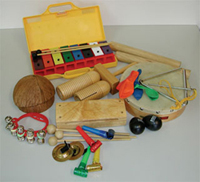
|
|
|
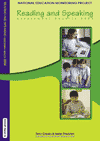 CLICK for
full report CLICK for
full report
|
GOOD
NEWS
•
More than 80 percent of year 4 and year
8 students were positive about their own
competence in reading, reading at school,
having their teacher read a story out loud,
and going to a library.
•
There have been improvements from 2000
to 2004 in oral reading of fiction
and non-fiction for year 4 and year
8 students. There were fewer year 4
students than in 2000 at the lower
levels of achievement. |
•
Although there is a moderate difference favouring girls at
year 4, there is little difference between girls and
boys at year 8 in both oral reading and comprehension.
• There
was a substantial reduction in disparity between year 4 Pakeha
and Mäori students in reading in English, between 2000
and 2004.
• The
improvement of year 4 students’ comprehension observed
between 1996 and 2000 was maintained in 2004.
|
 |
CONCERNS
 •
Most year 8 students can decode effectively, but a small minority
of students continue to find this difficult. •
Most year 8 students can decode effectively, but a small minority
of students continue to find this difficult.
• Summarising,
scanning text for information and selecting main ideas
pose problems for many students.
• Many
students reported that they do not get specific feedback
on what they are good at in reading and what they need to
improve.
• The
increase in oral reading achievement between 2000 and 2004
was not matched by corresponding increases in comprehension.
This is particularly so for year 8 students reading longer
passages. |
LOOKING
AHEAD –
SUGGESTIONS FOR PROGRESS
•
Students would benefit from a stronger focus on comprehension
through developing their conscious use of reading strategies
that involve making connections and inferences. Comprehension
can be enhanced through varied use of rich texts across a
range of curriculum contexts.
• Students
would benefit from more specific feedback and negotiated
guidance.
• Vocabulary
knowledge is essential to comprehension. Students would benefit
from opportunities to develop and expand vocabulary in meaningful
contexts.

|
|
 |
 CLICK for
full report CLICK for
full report
|
GOOD
NEWS
• Progress from year 4 to year 8 is clear.
This is particularly evident in the skills of giving
a complex set of instructions and in expressing
an opinion.
•
From 2000 to 2004, there has been substantial
improvement for Year 8 students and a small
improvement for Year 4 students’
performances in telling an imaginative story.
Students’
use of skills in oral descriptions and oral presentations
have been maintained since 2000. |
|
 |
CONCERNS
 •
There is continuing disparity between the performances
of different subgroups of students. Students in low decile
schools continue to perform at a significantly lower level
than students from high decile schools. There are also
substantial differences between the performances of Pakeha,
Mäori and Pasifika students, with Pakeha students
performing better, particularly in tasks where they had
to express an opinion and persuade an adult. •
There is continuing disparity between the performances
of different subgroups of students. Students in low decile
schools continue to perform at a significantly lower level
than students from high decile schools. There are also
substantial differences between the performances of Pakeha,
Mäori and Pasifika students, with Pakeha students
performing better, particularly in tasks where they had
to express an opinion and persuade an adult.
• Many
students had difficulty introducing themselves to
an adult. Year 8 students did not show confidence
in oral presentations that required spontaneous,
expressive qualities and year 4 students did not
perform well in tasks that required detailed oral
descriptions of available information.
• Concerns
raised in 2000 about speaking still remain in this
report. |
LOOKING
AHEAD –
SUGGESTIONS FOR PROGRESS
• Good oral communication includes elements of presentation.
Students need opportunities to develop the skills of confident,
expressive communication. They also need opportunities
to enjoy taking part in activities such as story telling,
presenting poetry and participating in a play. While opportunities
for developing confidence and skills in speaking can be
given in all areas of the curriculum, the Arts curriculum
offers particular scope.
• Students’
abilities to elicit deeper information through explorative
questioning requires them to attend carefully to
available information. To achieve this, the development
of speaking skills need to be integrated with skills
of listening, observation and thoughtful interpretation.
• Students
need opportunities across a variety of contexts to
develop the skills and confidence needed for voicing
and justifying an opinion. They need to learn how to
question and consider the opinions of others in appropriate
ways. |
|
ASPECT
OF TECHNOLOGY 2004 |
 |
|
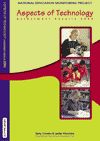 CLICK for
full report CLICK for
full report
|
GOOD
NEWS
•
Year 4 and 8 students continue to enjoy technology,
with 81% of year 4 and 93% of year 8 students rating
it positively. Year 8 students ranked it their
second favourite subject, with most saying they
learn ‘heaps’ or ‘quite a lot’ from
technology. Nearly half of year 4 and year 8 students
would like to do more. And they are confident:
72% of year 4 students and 83% of year 8 students
rate their technology learning positively. |
• Students
consider that they are exposed to a variety of different
aspects of technology. For example, changing things to
improve them, and designing and making things. However
they perceive themselves less likely to have opportunities
to find out what people want, need or like. Gender does
not appear to impact upon technological achievement or
attitude.
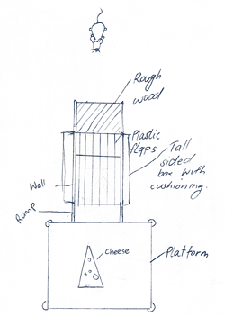 •
The NEMP tasks present opportunities for some creative technological
thinking across both year levels. There is evidence of
general technological progress between year 4 and year
8. This is particularly notable in detail given in explanations,
increased level of technological product knowledge and
knowledge of devices . Year 8 students also tend to be
able to identify and combine a greater number of variables
in technology activities, and the representation of their
technological ideas has become more sophisticated since
year 4. •
The NEMP tasks present opportunities for some creative technological
thinking across both year levels. There is evidence of
general technological progress between year 4 and year
8. This is particularly notable in detail given in explanations,
increased level of technological product knowledge and
knowledge of devices . Year 8 students also tend to be
able to identify and combine a greater number of variables
in technology activities, and the representation of their
technological ideas has become more sophisticated since
year 4.
• Year
4 students show improvement as a group, performing slightly
better this time than they did in 2000, while year 8 students
have maintaind their ground. Year 8 students show a reasonable
grasp of the nature of technology, with close competition
between those who view it in terms of ‘high technology’ (computers
and so forth) and those who see a link with designing and
making things.
|
 |
CONCERNS
• Perhaps understandably, while year 4 students can recognise
a variety of technological activities that they have undertaken
in the classroom, they seem to have difficulty in being able
to say what technology learning is about. Nearly half were unable
to give an explanation and the rest mainly view it in terms of ‘high
technology’ (computers, etc).
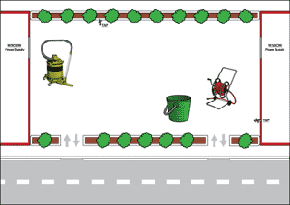
• Generally,
type and size of school has little impact upon technological
performance, however, there is a marked, comparative drop
in performance among students from low-decile schools, first
identified in the technology assessments of 1996, and still
very evident. Also bearing out previous trends, Pakeha students
are performing moderately better than Mäori students
and substantially better than Pasifika students. These differences
seem less pronounced when undertaking tasks which deal with
technological capability in terms of analysing, designing
and making solutions.
|
LOOKING
AHEAD –
SUGGESTIONS FOR PROGRESS
• Our students seem excited by technology, and they would
like to learn more. We can take our cue from them by involving
them regularly in a range of technological experiences that are
meaningful and captivating, and that help them to broaden their
understanding. We can help them to enrich understanding further
by discussing the nature of technology in general, including
the use of specific examples.
• When
undertaking technology, students sometimes respond in terms
of the obvious or surface aspects of an issue, artifact
or process. We could assist them to develop an eye for
detail (such as when analysing products or systems) and
an appreciation for the broad picture (such as when evaluating
the wider effects that technology can have within and beyond
their community/environment).
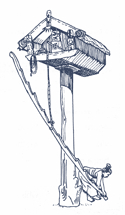 •
Student learning could be assisted by placing greater emphasis
on technological knowledge, particularly in terms of device
and system knowledge, and by placing greater emphasis on
the nature of technology. Students need our help to think
beyond the immediate in finding solutions to problems. •
Student learning could be assisted by placing greater emphasis
on technological knowledge, particularly in terms of device
and system knowledge, and by placing greater emphasis on
the nature of technology. Students need our help to think
beyond the immediate in finding solutions to problems.
|
|
|
READING
AND SPEAKING |
GOOD
NEWS
•
The trend from 2000 to 2004 shows positive
gains for year 4 Mäori students
in reading in English.
•
There was a substantial reduction in disparity for
year 4 Mäori students between 2000 and 2004.
The advantage of Pakeha students over Mäori
students decreased by one third between 2000 and
2004.
•
Mäori outperformed Pakeha on all reading tasks using
Mäori texts.
•
Like the general population in 2000 and 2004, year 8
Mäori students showed deeper understanding of
tasks overall compared to year 4 Mäori students.
•
The 2000 results show moderate differences in favour
of Pakeha at year 4 and year 8 in speaking tasks.
The trend from 2000 to 2004 shows a slight reduction
in disparity for year 4 students, but not for year
8 students.
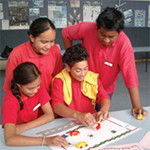 •
When Mäori students are exposed to reading in context
the results are most favourable. Mäori students
performed well in decoding of words. •
When Mäori students are exposed to reading in context
the results are most favourable. Mäori students
performed well in decoding of words.
• Compared to Pakeha students, Mäori students
at both year levels reported more guidance from the teachers
to help them improve their reading.
|
CONCERNS
• The aspect of reading that continues to present
challenges for Mäori, as it does for all students,
is the ability to read with understanding on a variety
of topics whether fiction, non-fiction, or non-book
materials.
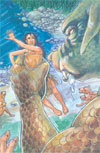 •
The tasks that showed large differences in favour
of Pakeha were those requiring analysis and
word definition. To sustain the considerable
gains made, it is crucial to continue emphasising
analysis skills and vocabulary building from
year 4 through to year 8. •
The tasks that showed large differences in favour
of Pakeha were those requiring analysis and
word definition. To sustain the considerable
gains made, it is crucial to continue emphasising
analysis skills and vocabulary building from
year 4 through to year 8.
•
Success for Mäori students in speaking tasks
is more evident when tasks use familiar contexts.
Discussing unfamiliar contexts presents students
with significant challenge.
|
LOOKING
AHEAD –
• Comprehension needs to be constantly emphasised
at word, sentence and paragraph levels. This is
necessary for children to master the foundation
skills of recall, interpretation and inference.
•
A challenge for teachers of Mäori students
between year 5 and year 8 is to maintain and
increase Mäori students’ interest
and enthusiasm for a variety of reading material,
including personal and recreational texts.
•
Mäori students need experiences that help
them to develop the language and confidence to
participate in more depth and breadth during oral
discussions. |
|
|
 |
MUSIC |
GOOD
NEWS
• Overall, Mäori and Pakeha students
performed comparably at both year levels.
•
Mäori outperformed Pakeha students
on tasks involving rhythm and harmony,
and demonstrated a wider knowledge of musical
genre compared to Pakeha students. Conversely,
Pakeha outperformed Mäori students
on tasks involving the ability to read
and interpret music notation.
•
Compared to Pakeha students, Mäori students
reported more involvement in singing and
listening to music in school, and in a variety
of music activities outside of school. They
were more positive about continuing to learn
and do music as they got older, and year
8 Mäori students were more positive
about singing in and outside of school.
|
LOOKING
AHEAD
Like all students, Mäori students need
opportunities to:
•
play an instrument;
• create and compose music;
• practise representing musical
ideas using a range of visual symbols.
|
|
|
TECHNOLOGY |
GOOD
NEWS
• Mäori students performed well
in applying skills to solve technological
problems.
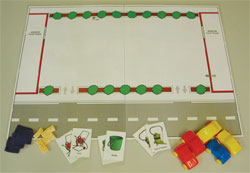
|
LOOKING
AHEAD
• Like other students, Mäori need
more opportunities and encouragement to generate,
investigate and evaluate design. |
|
|
|
|
|
 |
|
|